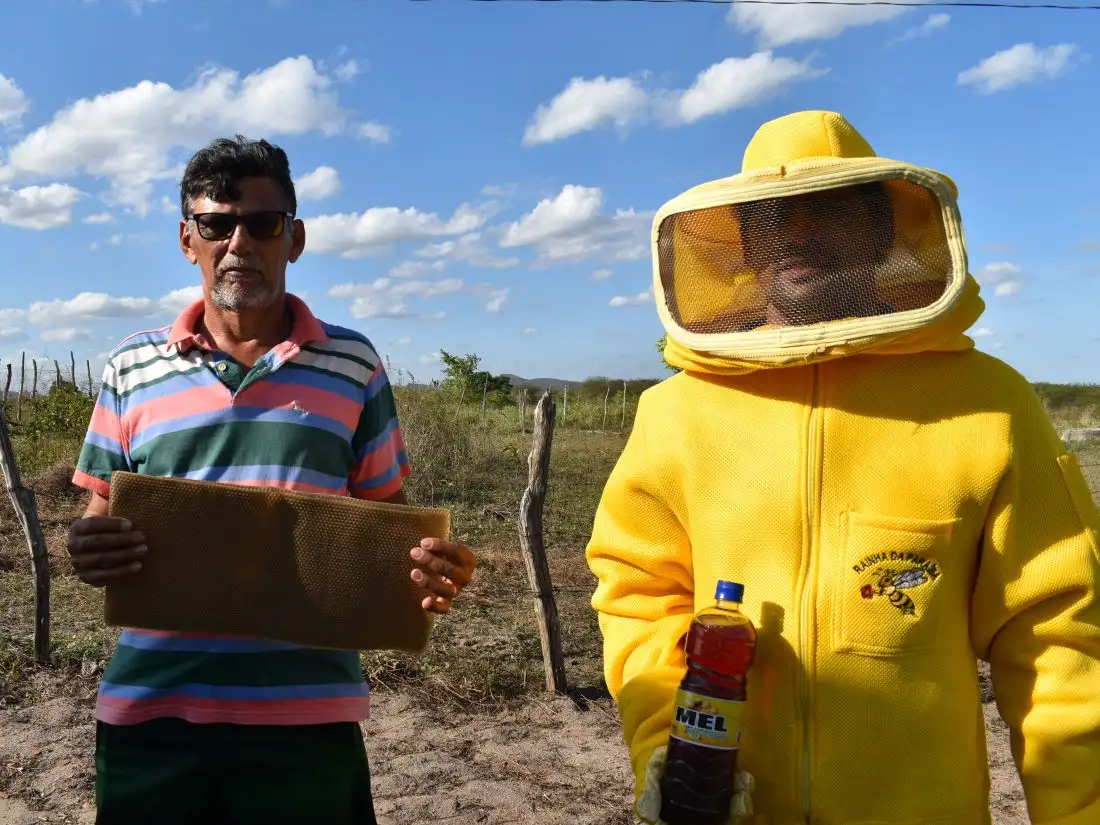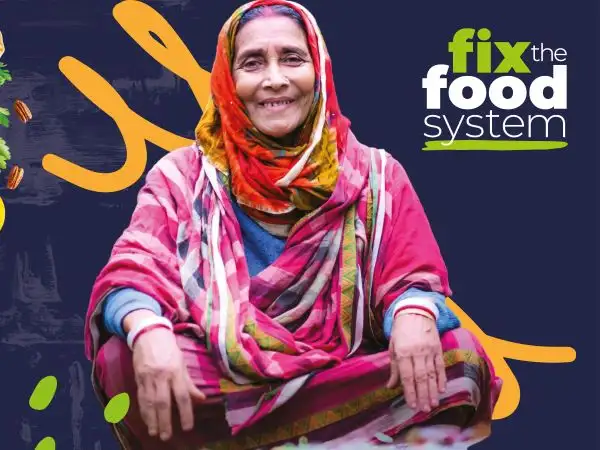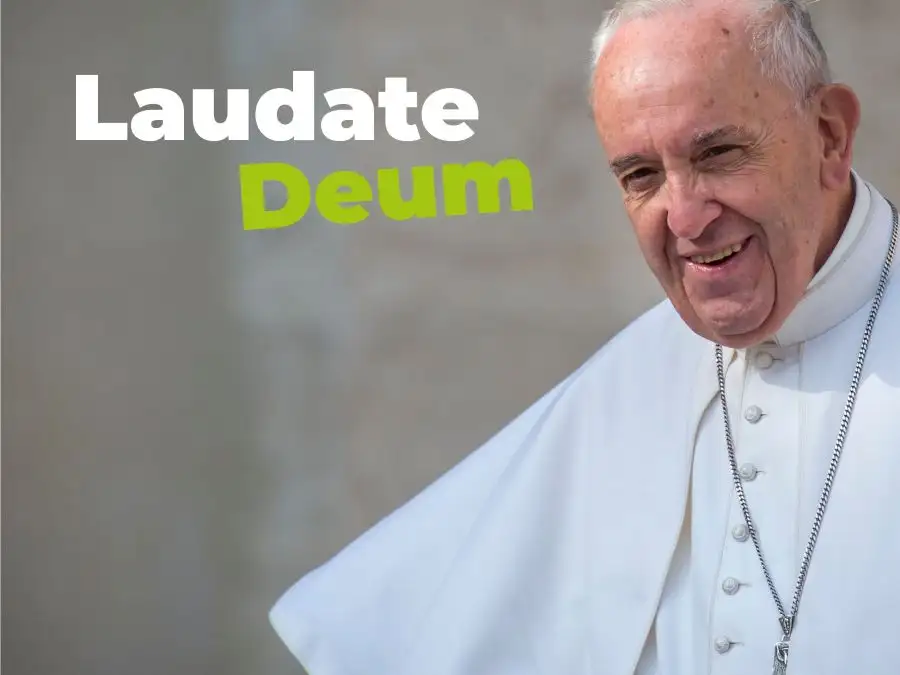The global food system is broken. It doesn’t work for those who work the hardest – small farmers – and it’s a major driver of the climate emergency.


Jose Muniz is proud of his bee keeping and honey production
In the past, the community was regularly terrorised by armed men who would shoot indiscriminately, kill livestock and set fire to their crops and straw houses. Food was scarce, droughts frequent and hunger never far away.
Not a day goes by without me thinking of Almir…There is not one grain of sand in this community that doesn’t have my cousin’s blood on it.
Sitting on the front porch of honey producer José and Maria’s home in northeastern Brazil, birds singing and a gentle breeze, Almir Muniz settlement feels like the most peaceful place in the world.
But the land that José and Maria tend so carefully, following agroecological practices – a method that preserves native plants and trees, and avoids artificial chemicals - was not always so tranquil.
In the past, the community was regularly terrorised by armed men who would shoot indiscriminately, kill livestock and set fire to their crops and straw houses. Food was scarce, droughts frequent and hunger never far away.
Tragically, in 2002 José’s cousin, community leader Almir Muniz, was forcibly disappeared on the orders of big landowners who didn’t tolerate his defence of the rights of sharecroppers experiencing poverty - tenant farmers who give a part of each crop as rent - like himself. His body was never found.
Our bond with nature
Praise be to you, my Lord, through our sister, Mother Earth, who sustains and governs us, and who produces various fruit with coloured flowers and herbs
As José and Almir fight to protect our common home, it’s important to reflect on Saint Francis of Assisi’s words that remind us that our natural environment is like a sister with whom we share our life and a beautiful mother who opens her arms to embrace us.
He shows us just how inseparable the bond is between the concern for nature, justice for those overcoming poverty, commitment to society and inner peace.
As a patron Saint of all those who study and work in ecology - the study of relationship between all living beings - he is an excellent example of care for vulnerable people and their environment.
Inspired by Saint Francis of Assisi, Pope Francis' 2015 encyclical Laudato Si' remains a profound invitation to everyone on the planet to care for our common home.
Bittersweet honey
Nature gives us so much, so we should care for her. We care for environment and the environment cares for us.
With support from the CAFOD-funded local organisation, Land Pastoral Commission of Paraíba (CPT), José and his community can continue to care for their environment and fight against injustices. They stand with them by informing the community of their rights, supporting them through terrifying evictions and demanding justice for Almir.
Today, with CPT’s and CAFOD’s support, José and his neighbours have secured formal land titles and continue Almir’s dream of viable and dignified rural livelihoods through new initiatives such as agroecological honey production, which works in harmony with the land.
José’s community have participated in CPT’s beekeeper and marketing training and has gained on-farm support and a new honey-processing unit. As a result, José and other honey producers has established their own cooperative and in 2022 saw incomes rise by 50%! In the past, José would extract honey outdoors which left impurities and made it harder to sell. Nowadays, José can produce a greater volume and quality of honey, get a better price and transform his neighbours’ attitudes towards bees and other insects by encouraging them to avoid chemicals toxic to pollinators.
With CPT’s support, José and the honey producers lobbied 18 local authorities and together established a local quality mark for processed foods. As a result, the honey producers can now sell their honey through local supermarkets and to government school meals and food support programmes.
Sustainable farming
Despite the improvements in José’s honey production, the climate crisis brings new challenges. The northeast of Brazil is already affected by drought and scientists say these will intensify in the future.
Last year, José experienced an unusually hot year and the trees flowered late. As a result, his hives only produced two honey harvests, when five or six harvests are usual.
Thanks to agroecological food production practices, farmers like José are building their resilience. As this environmentally friendly way of farming produces a greater variety and genetic diversity of crops, farmers can spread and reduce the impact of adverse events such as heavy rains, pests and drought.
This year, World Environmental Day focuses on land restoration and drought resilience. CAFOD continues to scale up integral ecology programmes, like the one José is part of, in Brazil to support communities to build resilience to the climate crisis and advocate for the needs of vulnerable and discriminated groups most affected by climate injustice.
As we hear a rallying cry to protect and revive natural environments all around the world, we will remember Pope Francis’ words in Laudato Si, “We need a conversation which includes everyone, since the environmental challenge we are undergoing, and its human roots, concern and affect us all.”
A fight for justice continues
Almir’s family and CPT continue their long fight for justice. In February 2024, family members of Almir, CPT and othersattended the Inter-American Court of Human Rights where Almir’s case was heard.
The Commission recommended that the Brazilian state make material and immaterial reparations to Almir’s family, investigate the event fully, bring the perpetrators and masterminds to justice and provide physical and mental health support to family members.
A prayer inspired by the Apostolic Exhortation Laudate Deum, a follow up to Laudato Si', released by Pope Francis on 4 October 2023.



